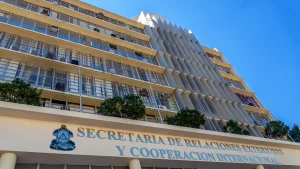Morning Daily Radio Program
DIARIO MATUTINO went on the air on Saturday, June 6, 1952, in its first broadcast through HRN «La Voz de Honduras.»
How did the radio news program that has been on the frequencies of the oldest radio station in Honduras for 60 years come about?
The idea of founding a national news program on HRN came from Doña Rosario vda. de Ferrari, who served as HRN’s Manager. She established an agreement with Arq. Don Julio López Pineda, Director Manager of Diario EL DIA, to provide the news material from the newspaper for broadcast on «La Voz de Honduras» in the morning hours.
Doña Rosario entrusted Lic. Rodolfo Brevè Martínez, who recently passed away, to receive the news provided by EL DIA and set up the news program that was baptized as DIARIO MATUTINO, with the hosting duties assigned to Lic. Gustavo Acosta Mejía.
To start the news project, Lic. Santiago Flores Ochoa, who served as the Editor-in-Chief of the important evening newspaper published in the capital, provided Lic. Brevè Martínez with national and international news on the afternoon of Friday, June 5, to be broadcast the following day from 6:15 to 6:45 in the morning.
The broadcast began using «Marcha de la Coronación» as the theme music for the program’s intro and outro, a musical identification that has remained for 60 years, first on a 78 rpm record, then on vinyl, magnetic tape, cartridge, cassette, and CD.
After a few months of working together with Diario EL DIA, Don Julio Lopez Pineda noticed that the newspaper’s circulation was declining because people were listening to the news on HRN in the morning, so they didn’t feel the need to read them in the afternoon when the newspaper was available.
After the agreement ended, Lic. Brevè Martínez had to use his journalistic ingenuity to gather and write news, bringing on board the first collaborators who acted as the initial reporters for the news program: Oscar Orlando Bonilla, who worked for Diario EL CRONISTA, and Raul Lanza Valeriano, who was beginning to venture into journalism under the guidance of Juan Ramón Ardón.
With the material from these two reporters and the telegraphic contributions from the first correspondents such as Pedro Escoto López from San Pedro Sula, Martín Baide Galindo in El Progreso, Amílcar Cruz Garín in La Ceiba, Dionisio Romero Narvaez in Olanchito, Mario Bardales Meza in Comayagua, Eugenio Palomo in Islas de la Bahía, Edilberto Cuevas Bustillo in Trujillo, Juan Ramón Aguilera Z. in Choluteca, and later in the 1960s, Leonidas Meza Recarte in Siguatepeque and Gustavo Argueta in La Esperanza, along with the editorial note written by Lawyer Acosta Mejía, DIARIO MATUTINO began to set the standard for the first radio news program in Honduras.
Other historical notes indicate that experienced journalists and privileged voices have passed through «El Informativo de la Vida Nacional,» giving continuity to the most important radioperiodical in the country.
Doña Rosario de Ferrari planted the seed that Brevè Martínez and Acosta Mejía diligently cultivated for many years, facing the challenges that arose during the de facto government of Don Julio Lozano Díaz and the situations that arose in heated moments of local politics.
Many times when referring to a radio program, only those who transmit their voices over the airwaves are mentioned, but the names of those who make the sound emission possible, the radio operators, are not recorded.
The first of them was Oscar Díaz Romero, followed by Jorge Flores, Carlos Amador, Carlos Eduardo Riedel, Santos Ramón Lagos, Delmer Valladares, Elías Mairena, and those from the contemporary stage such as Helmut Rivas, Nelson Valladares, and Asunción Huete.
After Acosta Mejía, who served as Director, the leadership of DIARIO MATUTINO was succeeded by José Francisco Morales, Nahum Valladares, Antonio Mazariegos Velasco, and René Zepeda at different times. Raul Valladares F served as Coordinator, and in the midst of the sorrow over the violent loss of Angel Alfredo Villatoro, Juan Carlos Barahona took over the coordination, assisted by the News Production Department and a dynamic team of reporters who have managed to position HRN as the top national radio station.
Among the qualified voices that have passed through the microphone of DIARIO MATUTINO, we also remember those of Jorge Figueroa Rush, Mario Hernán Ramírez, Moisés Ulloa Duarte, Juan Bautista Vásquez, Nahum Umaña, Benny Moncada, German Márquez Sr., and undoubtedly the voices of its directors: Acosta Mejía, Morales Cálix, Mazariegos, Valladares and Valladares, and René Zepeda.
The work of reporting has been essential in the informative projection of DIARIO MATUTINO, and we cannot forget the contributions made by figures such as Andrés Torres, Antonio Ocampo Santos, Martín Baide Urmeneta, Rafael Guillén, Freddy Cuevas Bustillo, Milton Mateo, José Ochoa y Martínez, José Trinidad Murillo, Danilo Izaguirre, Adolfo «Yofo» Hernández, Irma Santos, José Domingo Flores, Rolando Sarmiento, Ludovico Sánchez, and many others who dedicated their efforts and abilities to make DIARIO MATUTINO the most influential journalistic institution at the national level.
It is worth noting that since Lic. Gustavo Acosta Mejía instituted the Radial Commentary, DIARIO MATUTINO has benefited from valuable editorials crafted with responsible and objective judgment by journalists such as Moisés Ulloa Duarte, Herman Allan Padgett, Reynaldo Amador, and Nahum Valladares, as well as the profound work of columnists from the past, including Ventura Ramos, Carlos R. Flores, Ramón Villeda Bermúdez, Gerardo Alfredo Medrano, Napoleón Mairena Tercero, Amílcar Santamaría, Juan Ramón Martínez, and José Francisco Cardona Arguelles.



